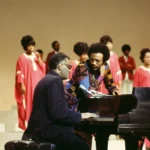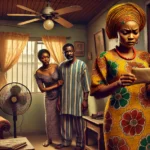Women and Participation in Society

An Exclusive with Ndam Nander Esmeralda
March 8, was over a week ago and is annually commemorated as International Women’s Day. The theme of this year’s IWD is #EachForEqual. Equal Opportunities for all.
Just about a week ago, there was a tweet chat tagged “On Female Political Participation”. The Topic of discourse was “Our Feminine Power. The Power of Female Participation in Leadership and Politics”. The chat featured Senator Uche Ekwunife, Inimfon Etuk, Hon. Ramat Abdullahi and Mark Amaza. Politics and Governance, unfortunately, is one area where Equality suffers.
Young women and female political representation in Nigeria is very low. What is your opinion about the state of female participation in leadership and politics. @amasonic#ourfemininepower #SheleadsCampaign #WomanBoss @Sikika_Afrk
— GenCED West Africa (@GenCEDgh) March 3, 2020
It was a pleasant conversation, and you should check it out. Ndam Nander Esmeralda was one of the facilitators of the chat. She is a women’s activist. I interviewed Esmeralda on the place of women in society and the state of women’s rights in Nigeria and Africa.
Hello Esmeralda. Tell us about yourself?
Hi, my name is Nander, Esmeralda Ndam. I am a lawyer, a unionist and, a Politician in summary. I am also a former Special Assistant to the Executive Governor of Plateau State on ICT. I am genuinely interested in making our society better. I am an activist, as well. I have advocated for some essential things, such as peaceful coexistence, political participation, inclusiveness, etc. I love reading beautiful stories about politics and Finance.
March 8 was International Women’s Day. Can you tell us how it feels being a woman in today’s world first and in Nigeria, secondly?
I would like to pick a quote from something Sinead Lim said in 2017, she said: “This is what it feels like to be a woman in this world. We are strong, we are independent, and we can look after ourselves, yet we are vulnerable, we are emotional, and we are fearful�?. We are walking contradictions!!!!! Hahaha, It’s hard to describe what it feels like to be a woman in our world today because women are good at hiding what they are. One of the best things about being a woman is that you can always hide your blemishes.
In the world today, women are faced with many challenges, some of which they were aware of before now and others just recently created. Some of these problems include an inferiority complex, lack of ambition, inequality, etc
In Nigeria customs and traditions “seem�? to be at odds with the progress of an average woman, our mothers say things like “if you don’t wake up early enough to boil bathing water for your brothers how would you learn to do it for your husband?�? or other mundane things like “if you become too ambitious, no man will marry you�?.
It has become so traditional that one time, the President flew out of the country, to a place of Powerful women (Angela Merkel) and said something like “the place of a woman is in the other room�?.
That statement should have brought shame and worldwide lasting outrage, but it didn’t. That is what it feels like to be a woman in the world today.
You were part of a tweet chat some days again talking about Women and Women’s participation. Can you share the highlights from the conversation?
As I said, some days I sleep, and wake up and I feel enough outrage to become an activist and advocate against ills of the society. I met some amazing young women at the Young women political leadership fellowship. We got together and decided to do awareness on the importance of harnessing feminine power in leadership roles and political roles. We were fortunate enough to get some amazing women who had experience in the political sphere.
It was such an amazing interaction, we discussed the low female representation in Nigerian politics, the barriers to female participation in leadership roles and political roles, the rising consciousness of closing the gender gap in politics, and so many similar topics.

What are your personal opinions about the issues raised like Women participation in Politics?
I think that these issues are very serious, almost like an endemic if not more than. More women should participate in politics. I think this is one of the foundations of democracy itself. I think so because democracy is about inclusiveness and increased participation, so I don’t think that anyone should be excluded or should exclude themselves from participation because of gender. These were some of the issues we discussed in our tweet chat, we all agreed that women’s participation in politics helps to address gender equality and it affects both the range of issues that are considered in policy formulation, those not considered and those proposed. I also think that the uniqueness of the methods used by women to address issues is a gem that hasn’t been tapped enough. Research shows that a gender-balanced organization is likely to produce more impact.
You once participated in Politics. What was your, experience and what did you learn?
Hahaha, I am a politician, not “once�? and well, it took me a very long time to accept the title, and now that I think about it, I wonder why. Politics is about holding leadership positions, more like a call to service. I was first called to serve in a big capacity in secondary school when I was appointed the dual responsibility of “social and prep perfect�?. I had held previous positions of the class representative, head of the News casting team, football captain and the likes but this required more time and energy compared to the others. So when I got to the university to undertake my tertiary education, it seemed natural for me to say I wanted to represent my class at the parliament.
I didn’t know this was a different kind of responsibility, so when I began running campaigns and going through the intrigues and nuances that came with convincing people that you had their best interest at heart it was kind of tasking since everybody kind of viewed you with suspicion and expected financial assistance rather than the yearning to prove your capacity or capability.
However, whenever I say this story, I always remember to say how fortunate I was to be surrounded by some of the best people in the world and so I went on to hold the position and eventually become the deputy clerk at the student union government. This position made me realize that there was still a lot to be done for the students, the powers of which lay with the position of the President of the student union government. I, therefore, decided to contest for the position of president of the student union government. I went on to contest with 4 other men and I came to the second runner up. So although I lost the election, my experience was an interesting and impactful one because It all seemed impossible because of a stereotype that existed that the position of president was reserved for men until I attempted and failed. After that, several young ladies began to contest for the position of president at their departmental levels and some even won the elections.
I realized at that moment that I had inspired other young women to know that the position of president was open to all. It was then that I learned that we must never shrink away from responsibility especially when we are young and little by little the glass ceilings would be shattered.
I believe one of the keys to solving problems is finding and attacking the root and base of the issue. What do you think is or are the basis of the issue of women’s rights in General in Africa?
I think that what you mean is, what is the root cause of the agitation for women’s rights. The question of gender is normally ignored in the development of policies or programs for dealing with economic, social and cultural issues. The 1995 UNDP Human Development Report rightly said: “For too long, it was assumed that development was a process that lifts all boats and that it was gender-neutral in its impact, however, experience teaches us otherwise�?. Differentiation based on gender is at the forefront of these agitations, these differences are biological, social and are most times taken for granted in establishing social position and hierarchy, providing access to resources, and participation in society and creating stereotyped roles for men and women.
Social institutions such as the family, religious groups, caste systems, political structures, economic and educational institutions, and the mass media are all saturated with norms and values that discriminate against women and legitimize and institutionalize social placements based on gender.
Women’s rights are human rights – they are the same rights that accrue to men but women are frowned on because of their gender. An example, the right to own property, the right to work and the rights at work, the right to health, etc. The present agitations are merely for the implementation of these rights. A gender perspective on health, for instance, is not the same as focusing on women’s health, it is examining the different health needs of both men and women, the risk factors, the determinants and access to healthcare. Women’s rights to inheritance, or equal shares to matrimonial property, are denied in most communities. The reason why the situation is worse in Africa is because of the customs and traditions that promote patriarchy. Women are less likely to be literate because not enough young girls proceed to earn a degree or go to higher institutions. In developing countries, women have fewer job opportunities because employers prefer to employ men, in Japan, for instance, women receive 51% of the male salary, and women who not in paid employment tend to work longer hours than men.
Can you comment on the level of girl child education in Nigeria?
The level of girl child education in Nigeria is extremely poor. Enrollment rates for tertiary education are only a third of the men. In Africa, the statistics according to google show that as of 2017, only about 65% were literate meaning that one-third of the people aged 15 and above were unable to read and write, according to Digest education statistics, it was 59.3% in females and 70.9% in males.
I think that compared to the 1960s, there has been significant but not enough improvement. You find that even women who make it to the universities only hope to be married soon afterwards. I think that more women and young girls should aspire to be experts in their chosen fields, some want to be housewives and though some of my friends argue that you do not need to be educated or literate to be an expert in that field, I do not agree with them. I think that is the whole point of home management as a course.

How do you suggest these issues are attacked at the infant stage?
I think that the importance of learning, unlearning and relearning cannot be overemphasized. We need more education, we need to be educated by educated people right from childhood and not half-baked persons. We need to educate our mothers that the era of being average or trying to fit into a particular institutionalized idea of women is long gone. Our mothers need to know that young girls can be leaders too. We need to train our mothers to stop being afraid of being who they are.
Do you intend to use your position and career to create change in these areas?
Investing in girls’ and women’s right to political participation is a necessary step to achieving global gender equality and democratic governance. I intend to train and inform as many young women as I can on the fundamental elements of politics in Nigeria, as much as I can, I intend to give as many as I can the required support to participate in positions of leadership and ultimately effect change.
What is your word for the Nigerian Woman Today?
My word for the Nigerian woman today “You do not have to be strong all the time, do not be scared of being who you want to be, do not be deterred in your fragile moments too.�?.
Wonderful and powerful words from Esmeralda. I can only hope that one day we get to see a world of Women’s Rights and participation in Politics and Governance. And even if we don’t live to see it, may it not be said that we did nothing to create it.











